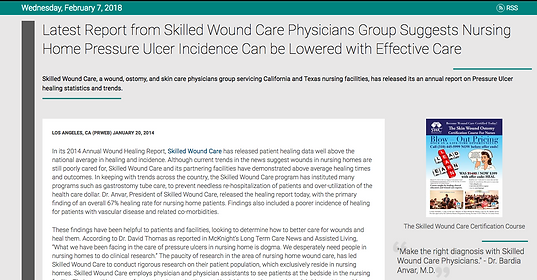
NEWS
from SWC
Serial Surgical Debridement of Common Pressure Injuries in the Nursing Home Setting: Outcomes and Findings
November 07, 2017
This study examined the efficacy of bedside surgical debridement in a nursing home population.Materials and Methods. A retrospective chart review was performed of sacrum, sacrococcyx, coccyx, ischium, and trochanter (SSCIT) region pressure injuries in the Skilled Wound Care practice (Los Angeles, CA). The patient population was refined from 2128 to 227 patients visited 8 or more times during nursing home stays found to have 1 or more SSCIT pressure injuries. Of the 227 patients, there were approximately 319 individual SSCIT wounds, with an average of 1.4 SSCIT wounds per patient. Bedside surgical debridement was performed using a sharp excisional technique on 190 of 319 (59.5%) SSCIT wounds.
Wound Care Pressure Ulcer Radio Interview WOCA
July 27, 2017
Nursing facility wound care discussing pressure ulcers and woundposium with WOCA The Source Radio. Skilled Wound Care is the nation's leading wound care program for nursing homes, providing professional wound, ostomy, and skin services. Call us today for a comprehensive program at (310) 445-5999. Skilled Wound Care provides quality assurance, risk reduction, education and weekly wound rounds with bedside wound debridement. It is important to have a physician program at your nursing home or nursing facility to assess these wounds: Deep Tissue Injury, Unstageable, and UTD with you to get the right diagnosis
Avoiding lower extremity amputation
December 12, 2016
Given the prevalence of diabetes in the United States, the fact that the disease is the number one cause of lower extremity amputation is an extremely serious matter. Worldwide, a lower limb is lost to diabetes every 30 seconds and in the U.S. alone, some 2 million Americans are living with a lost lower limb.
According to the World Health Organization, lower-extremity amputations are 10 times more common in people with diabetes than in those who don't have the disease and represent half of all amputations in the U.S. In addition to being physically and emotionally devastating to patients, diabetes-related amputations cost our healthcare system some $3 billion dollars per year ($38,077 per amputation).
◄
1 / 1
►












